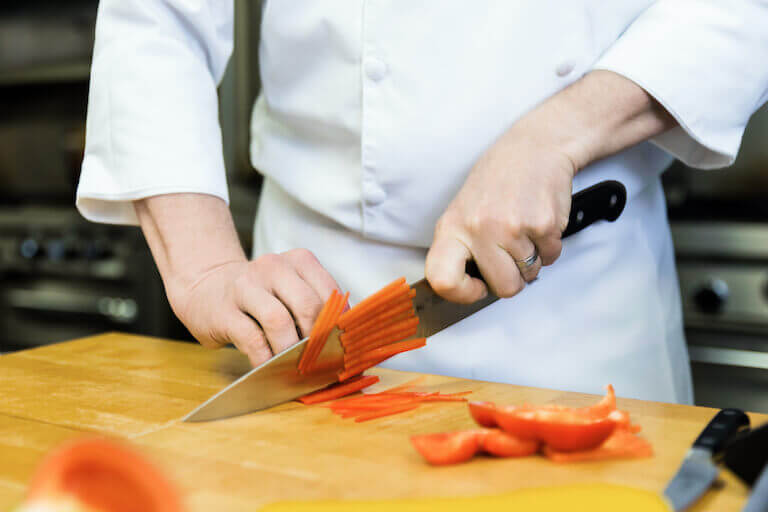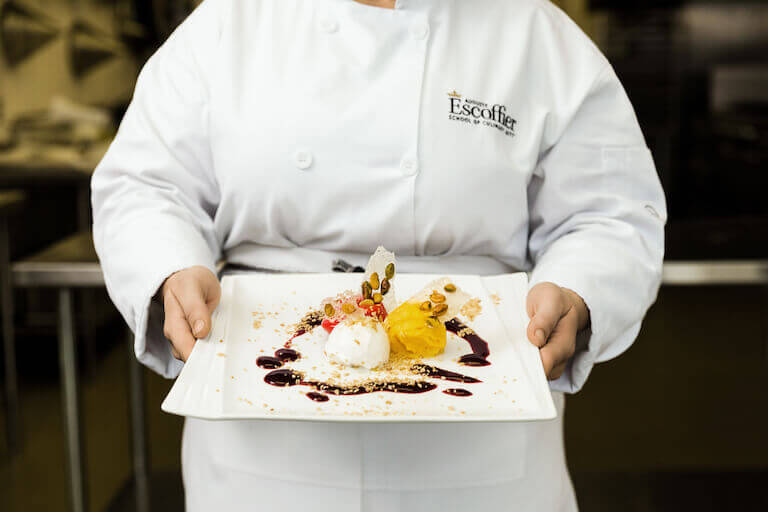If you’re looking for highly specialized, skills-focused training in the culinary arts, an associate degree may be the solution. A hands-on program at a dedicated culinary school can help prepare students for an entry-level position in a culinary establishment in 60 weeks!
Auguste Escoffier School of Culinary Arts offers two associate degree programs. The Associate of Occupational Studies Degree in Culinary Arts is available through our Boulder, Colorado location, both on-campus and online through a 100% virtual program with a hands-on industry externship. The Associate of Applied Science Degree in Culinary Arts is available at our Austin, Texas campus.
All programs can build a foundation of culinary skills and business-focused knowledge that graduates can bring with them into their culinary careers, whether that’s working as a sous chef, starting their own restaurant or food truck, becoming a food stylist, developing recipes, or one of many other paths.
If you’re interested in getting your associate degree in the Culinary Arts, here’s why Escoffier should be at the top of your list of schools.
Balanced Curriculum
The heart of a culinary arts education is in the kitchen. Knife skills classes, proper sanitation and food storage, the basics of baking and patisserie, flavor development and balance, and world cuisines—all of these topics may be explored through the curriculum in our associate degree programs.
But there’s more to the culinary industry than cooking! That’s why classes at Escoffier can also have a business focus. Students can explore financial planning, professional communication, and restaurant operations as well.

In Culinary Entrepreneurship, students can dive into practical topics like government regulation and legal issues. The final project for the course is to create a business plan for a fictional culinary operation. Students can create their own business blueprint, addressing funding, a marketing plan, and sales projections for their theoretical businesses. All of these topics are led by professionals with plenty of hands-on experience, such as Chef Alisa Gaylon who has worked as an Executive Chef, Restaurant Owner, Training Chef, and Restaurant Consultant.
At Escoffier, each course can prepare you for a career in Culinary Arts. Even our general education courses include a focus on culinary education.
For example, students can complete their writing requirement with Technical Writing for the Hospitality Industry, which may explore topics like writing for supervisors or for customers within a food-focused workplace. And for a science course, students may take the Science of Nutrition, which dives into the way our bodies absorb nutrients.
One of the most popular courses in the curriculum is the Farm to Table® Experience. Students can study the relationship between food producers and the kitchen. On-campus students might spend one day per week on a working farm or with a food producer to learn about how food is produced. They can bring what they learn back to the kitchen, and even plan an event for friends and family to enjoy. Online students can study the same concepts and have the opportunity to attend weekend workshops for hands-on experience (not for academic credit.)

Culinary Externship
All programs at Escoffier, whether they’re on campus or online, require that students complete a culinary externship in order to graduate.
This can give students a chance to continue learning and practice cooking in a professional setting. It can also let them experience different culinary establishments, like a restaurant, hotel, catering business, cruise ship, resort, or banquet hall. This can help students to narrow down what they’d like to pursue for their future career goals.
Escoffier externships have the potential to be paid positions, so students can also possibly earn some income while completing this requirement. And externships can often lead to full-time employment offers.*
Dedicated Chef Instructors
Escoffier’s team of Chef Instructors includes many professional chefs with years of industry experience. They include American Culinary Federation certified chefs, James Beard Award nominees, and winners of cooking competitions across the country who have rock-solid culinary or pastry technical skills.
But they also have to be outstanding teachers. Escoffier is dedicated to the ongoing training and development of its faculty to ensure just that. Faculty are trained to provide great instruction and student support and they regularly explore the latest instructional theories and technologies available to make classrooms come alive.

Faculty members can be available to answer questions and provide advice to students when students may need them. This can take the form of one-on-one appointments, Q&A sessions, or even a simple email or text message. Escoffier’s Chef Instructors are dedicated to student success!
Of course, the more effort you put into utilizing your Chef Instructors, the more tips and knowledge you’ll be able to glean from them. When you put in the time, you may find an instructor or two who will be willing to serve as a mentor, as Culinary Arts graduate and Research and Development Consultant Chris McAdams found.
“Because I was proactive and because I went to my instructors and tried to develop a one-on-one relationship with them beyond just doing the curriculum, I was able to derive so much more information from them–ways of execution and methodologies, and techniques–that other people didn’t get because they were in and out as quickly as possible,”* McAdams said.
Affordable Tuition & Financing Options
Some culinary school programs can cost $50,000 or even $100,000 by the time you receive your degree. This price tag can scare prospective students away from an education in culinary arts.
At Escoffier, we’ve designed our programs with affordability in mind. Associate degrees at Escoffier range from $31,255 to $35,685 for online and on-campus programs as of May 2022. And since Escoffier is a nationally accredited culinary school, some students may also be eligible for federal financial aid if they apply and qualify.
We suggest that students start with scholarships since these don’t have to be repaid. Many groups offer financial awards to students who qualify and apply.
Then, fill out the Free Application for Federal Student Aid (FAFSA) to see what federal loan or grant money you may be eligible for, like direct subsidized or unsubsidized loans.
Along with scholarships and Federal Loans, there are other options for funding your education, such as the Parent Plus Loan for Dependent Students and School Payment plans at no interest.
We understand that each student’s needs are different and that not everyone is eligible for the same funding. Our Financial Aid office is trained to help students through the process and discuss available funding options with the student.
Unparalleled Student Support
Escoffier students are never just a number on a page. They’re individuals with unique needs and challenges. At Escoffier, we want to offer every student the chance to succeed, so we’ve put specific measures in place to help them achieve their educational goals.
We assign each Escoffier student an advocate to help them overcome challenges they may face during their programs. For online students, this is a Success Coach. For on-campus students, it’s an admissions representative. These advocates reach out to students who need a little extra support, whether they’re having trouble academically or personally.
“I encourage anyone who wants to invest in their culinary career to attend Auguste Escoffier School of Culinary Arts! Their online program is top tier and the staff work tirelessly to support students because our success is theirs too.”*
Shamaya Williams Coats, Culinary Arts Graduate & General Manager, Leaf and Grain
Graduates may also receive job search assistance, which can include resume writing help, interview prep, and access to job boards where they may be able to find employment opportunities.
Escoffier students can also have access to a robust alumni association where they can network with other graduates to learn about employment opportunities, receive advice, and pick the brains of those further along in their culinary careers.
Start Your Culinary Career at Escoffier
An associate degree in culinary arts can be a stepping stone to an exciting career cooking professionally in the industry. With a high-quality curriculum, highly-skilled Chef Instructors, outstanding student support, and an affordable** price tag, Escoffier could be the right place to get started.
To apply for admissions to an associate degree program at Escoffier, contact us today.
Interested in learning more about degrees and diplomas at Escoffier? Try these articles:
- Who Hires Online Culinary School Graduates?
- College Not For You? Try Culinary School
- Is a Culinary Diploma or Degree Worth It?
This article was originally published on September 11, 2017, and has since been updated.
*Information may not reflect every student’s experience. Results and outcomes may be based on several factors, such as geographical region or previous experience.
**Consider your situation and resources to determine what is affordable and on budget, for you.



